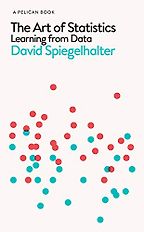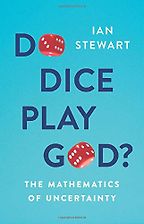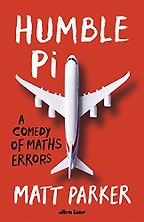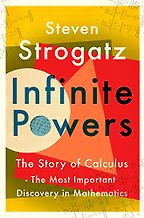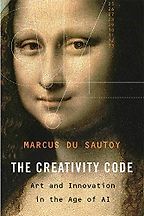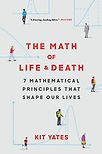We’re talking about the best math books of 2019. Would you say it’s been a good year?
The market is booming at the moment. There’s not only a lot of math books out there, but a lot of good math books. Certainly the titles that I’ve chosen I’ve been really excited about reading, compared to some other years. These books are must-reads for me. So yes, it’s been a good year.
Are there generally more popular math books out there than, say, a decade or two ago?
Popular science has been growing in general, but I would say that up until quite recently there was a bit of a dearth in math. The popular math books that were out there were almost always about pure mathematics and, as an applied mathematician, I felt we hadn’t really been catered for. Two of the more famous math books in the past were Simon Singh’s Fermat’s Last Theorem (1997), which is about a pure mathematics theorem, and Marcus du Sautoy’s Music of the Primes (2003), which was his big breakthrough book about prime numbers.
But that’s really changed now, and this year—at least amongst the choices that I’ve made—there are some really good applied mathematics books.
Let’s look at those choices now. Let’s begin with The Art of Statistics, which is by Cambridge University professor and statistician David Spiegelhalter. Do you want to tell me what it’s about, and why it made your list of best math books of 2019?
The Art of Statistics is a really accessible and comprehensive introduction to statistics. It’s not only about the tools of statistics, but it also goes through lots of interesting and relevant areas where statistics can help us make important decisions. For example, Spiegelhalter looks at whether Harold Shipman (a British doctor who murdered more than 200 of his patients) could have been stopped sooner.
“Data doesn’t speak for itself. We need to speak for the data”
He also tries to pique people’s interest by looking at, say, the results of the national sex survey, or the variations in the numbers of deaths at different hospitals. He looks at how to predict who survived the sinking of the Titanic, given incomplete data. He makes statistics accessible by providing real world examples. I found that really engaging—and I learned a lot about statistics at the same time.
He says in the book that he feels data literacy really needs to be improved. Do you agree with that?
I absolutely do. We’re living in the age of big data. There’s more and more data being collected. It’s not like situations in the past, where collecting data was very difficult to do and you had to make the best you could with the limited data that you had. Nowadays, we’re almost overwhelmed with data, and as he discusses in the book, it’s important to be able to pick out the signal from all the noise. What are just fluctuations around the true signal? How do we access what the real signal is coming through? That’s a really, really important problem.
The other thing that he emphasizes is that data doesn’t speak for itself. We need to speak for the data. We need to interpret the data, and it’s the way that we interpret it that tells the story.
So it’s subjective?
To some extent. Spiegelhalter recognizes that part of the limitation of statistics is the fact that which tests you choose to apply to a certain dataset is subjective.
He also emphasizes that when you’re trying to prove something, you set out this null hypothesis. Then you check to see whether your data differs from the null hypothesis. But you can never confirm the null hypothesis; you can never say the null hypothesis is true. You can only say, ‘My data is consistent with this null hypothesis’ or ‘This data doesn’t support rejecting it. This is more evidence towards its truth.’
And that’s the way science works in general. Science has theories that have not been proved to be false. It’s not that they ever get proved to be true—they just accrue more and more evidence, more and more weight attached to them.
That’s quite different from math. Mathematics has theorems that are proved to be true based on fundamental axioms. You work all the way up from the bottom using deductive reasoning, while science uses induction. It’s important to note that statistics, although it’s about mathematics, is actually more of a science.
Spiegelhalter is quite open about the limitations of statistics, isn’t he?
He’s very honest about the potential limitations of statistics. If you don’t have enough data, then you can’t draw a reliable conclusion. And that’s something important to acknowledge more generally as a scientist: that science and math don’t always have all the answers.
I got the impression that the book is useful not just as a popular math book, but also for students of statistics. We learn quite a bit about some of the tools of the trade.
Yes, it gets deep in some places. What I liked about the way he wrote The Art of Statistics was that he signposted when it was getting deep. He says, ‘This is going to be the hardest chapter that you have to read. If you can get through this, then you’ll be fine.’ Then, at the end of the chapter, he says, ‘even if you didn’t get this, it’s completely fine. Lots of students of statistics don’t understand it.’
“If David Spiegelhalter were my statistics teacher, I maybe would have done more statistics in my life”
It’s as if he’s writing for a student audience, and I can imagine him giving the book to his undergraduates and saying, ‘Read this first and then we’ll start talking.’ I can also see places where he’s clearly taken examples from his teaching. At one point, he’s talking about whether people fold their arms left over right or right over left. He’s actually taken the data from a set of his students where they’ve done this as an exercise.
I have to say, if David Spiegelhalter were my statistics teacher, I maybe would have done more statistics in my life. I’d be absolutely delighted.
Does he look at the history? He mentions at the beginning of the book that the discipline of statistics began with Pascal and Fermat in the 1650s.
With a lot of the ideas he introduces he does talk about the different people who have been involved, like Karl Pearson, Ronald Fisher, Thomas Bayes. He mentions them not only in terms of their scientific contribution, but also in terms of their personality. Spieghalter basically says that Fisher was a fantastic scientist, but morally dubious because he believed in eugenics and had ties to the tobacco industry and tried to deny that lung cancer was linked to smoking.
What’s interesting is that when Spiegelhalter talks about these historical figures, and why they came up with these statistical tests or statistical measures while giving context about who they were personally, he divorces the two things. It’s quite a nice idea that you can be revered as a good scientist at the same time as being condemned for being a horrible human being. Francis Galton is another one. He was an absolutely fascinating mathematical character and had so many brilliant ideas—but also founded the concept of eugenics.
Let’s move on to the next of the books on the your list of the best math books of 2019 which is Do Dice Play God? by Ian Stewart. This is a history of uncertainty, starting off when people used to read entrails to find out the future.
In the introduction of Do Dice Play God?, Ian Stewart goes through these ‘six ages of uncertainty,’ all the way from reading entrails, to quantum mechanics at the start of the 20th century, to more recent findings like the development of chaos theory in the 60s and 70s. The book has an interesting setup in that some of the chapters are very applied. For example, he has a short chapter on math and the law. But then some of the chapters are very theoretical.
The thing I’d say about Do Dice Play God? is that it is very rewarding, but you do have to invest in it. It gets very, very deep at some points—not just A-level or undergraduate-deep, but graduate school deep. He explains some really complicated concepts in the book.
What kind of concepts?
He goes very deep into quantum theory, deeper than I’ve ever read in a popular science book before. He really is looking at how the uncertainties that we now understand as inherent in quantum theory can stop us from predicting the future, or at least make it very challenging to do so.
Another concept he goes into is chaos. Chaos is usually characterised by a dynamical system which has sensitive dependence on initial conditions. Let’s say you start two systems off very close together, like two instances of setting off a double pendulum. Even though the equations which predict the motion of these systems are deterministic—if you had perfect knowledge of where they started, you should be able to predict the state of the system as far as you like into the future—after a while, they will diverge.
Five Books interviews are expensive to produce. If you're enjoying this interview, please support us by donating a small amount.
The weather is a classic example of a chaotic system. The equations that rule the weather are all completely deterministic. There’s no probability inherent in them. But if you don’t know the exact initial conditions for the weather—what the weather doing is now—when you run these equations forward, after a day or two, they’ll become completely desynchronized. If you have even slight uncertainty in your initial conditions, when you run things forward, one prediction might predict sunshine and the other a thunderstorm. In the book, Stewart gets quite deep into the theory behind the chaos, looking at attractors, for example.
Isn’t it always hard to predict the future?
Yes, but in this case it’s not because of probability or chance. It’s not like there’s someone behind the scenes flipping a coin so that we don’t know which way things will turn out. There isn’t anything inherently uncertain in the equations that govern many aspects of world. It’s because we’re looking at these complex nonlinear systems that will diverge from each other, even if they start very close together.
“Chaos is inherent in these complex nonlinear systems”
The motion of the planets is another example. We can actually predict where the planets are going to be in millions of years’ time. But if we have some uncertainties about their positions, then after a few million years we might predict that Mercury is on one side of the solar system when in fact it’s on the other. Chaos is inherent in these complex nonlinear systems.
Was your enjoyment of the Do Dice Play God? more about surprise at some of the examples, or satisfaction at understanding the math behind them?
A bit of both. Another thing that’s really nice about the book is that Stewart uses solid mathematical arguments to make important political points. For example, he looks at climate change. He points out that we can’t infer whether climate change is happening just by looking at single weather events, because the weather does fluctuate a lot. What we need to be looking at is long-term averages and whether we see a trend in temperature increasing over time. He gets quite political at some points—about why the Trump administration is denying climate change, or not taking more action on climate change, but his points are always backed up by solid mathematical arguments.
Ian Stewart is one of the best-known writers of popular math books, isn’t he?
Yes, he’s written lots of popular math books. The title of this book is a play on what’s probably his most famous book, Does God Play Dice? (1989). He’s also a serious academic. He’s a fellow of the Royal Society and really well respected in his field. He’s worked on lots of different areas, including my own area of mathematical biology. So he’s highly regarded both academically and for his popular math books.
Next on your list is a book by Matt Parker. It’s called Humble Pi: A Comedy of Math Errors, and it is very funny.
Matt is a stand-up comedian and he’s a very funny guy. He makes mathematics interesting by making it funny. In this book, he pokes fun at people who’ve made silly mathematical mistakes, but at the same time he also looks at some issues that are quite serious: bridges collapsing and killing people, for example. He can do the somber, serious stuff as well. It’s a great book. As far as I know, it’s the first math book that’s ever been a number one bestseller.
Is it a bit like your book, The Maths of Life and Death, where you’re looking at math mistakes, in order to learn from them?
Out of the five books, it’s probably the most similar to mine in that it looks at real stories and moves around different application areas to illustrate different mathematical ideas. There is an aspect of learning from the mistakes and there’s a nice example he gives about aviation engineering where lots of mistakes combined to cause a disaster.
Get the weekly Five Books newsletter
He talks about the Swiss cheese model: this idea that for a catastrophe to occur in aviation, it should be like dropping a ball down lots of stacked layers of Swiss cheese. It might get through the first hole and maybe even the second, but it will hopefully get stopped at one of the layers lower down. The more layers of safety checks you have, the less likely it is that a catastrophic disaster will occur. But sometimes, all these holes seem to line up for some reason, and then you get a disaster.
He doesn’t try to provide the tips and tricks that I’ve put in The Maths of Life and Death, but he certainly looks at lots of real world areas and tells lots of interesting and funny stories.
I thought his asides were really funny, like where he’s complaining about how all the road signs in the UK for football stadiums are wrong because it’s not possible to make a ball entirely out of hexagons.
Yes, he had this campaign and a petition to Parliament and it got more than 20,000 signatures. He’s very funny when he’s doing it. He knows what will tickle people and what will engage them. It’s a great way to get people thinking about math, and it’s great that you think about that when you drive past the football signs now. As do I—I saw some much more realistic football signs signs when I was in Italy on holiday, so I took a photo of them.
He does lots of little campaigns about math in the real world. He has a big YouTube channel, so he publishes some great stuff there as well.
I like the comment he makes in the book, ‘All humans are stupid when it comes to learning formal mathematics.’ For those of us who struggle a bit more with math, it’s nice to be reassured that it’s natural, and you’ve just got to get on with it rather than giving up hope.
He’s absolutely right about that. Sometimes when you’re doing formal mathematics, you just have to give up your intuition. It’s almost like walking on a tightrope. You’ve got to give up your safety net, what you think should be the case, and just follow the rules that you’ve been taught in mathematics to try and build a bridge, to get over the chasm. I think often, our intuition—especially in areas like probability—is absolutely horrible.
“Sometimes you have to just let go of your preconceptions and follow the rules of mathematics”
For example, we’re not good at understanding randomness. Matt gives this nice example from when he was a teacher. One homework he used to set was for kids to go away and toss a coin 100 times. And he could easily tell which kids had actually tossed the coin and which kids had just made it up, because achieving five heads or five tails in a row is actually really likely if you toss a coin. But no one who’s just making it up will put five heads or five tails in a row, because it just doesn’t seem random enough.
It’s the same in the lottery. People tend to veer away from putting two consecutive numbers because they think that’s not random and that randomness means being well spaced. But in half of all lottery draws, two consecutive numbers come up. Randomness is not about being well-spaced; clusters appear in random distributions all the time.
Sometimes you have to just let go of your preconceptions and follow the rules of mathematics, which is why learning math can be quite difficult.
Is he still a teacher?
Not anymore, but he still does a lot of stuff with schools. He has a company called Think Maths and they get people to do talks in schools. He’s really keen to educate people about math. He’s really one of the good guys.
Next up is Infinite Powers by the mathematician and Cornell professor Steven Strogatz. This is a wonderful introduction to a topic which terrifies lots of people when they’re at school, which is calculus. Tell me about the book and what you like about it.
I learned so much from this book, mostly about the history not just of calculus but of our subject, mathematics, in general.
The other thing I really like about it is that it explains calculus in a way that you’re not really ever taught at school. Calculus is the subject of change and understanding how things vary with each other. Strogatz takes this really intuitive view of it. He breaks things down to their simplest components and shows you why these rules—that you learn almost as rote in school—work.
For me, some of the ideas in the book I’d seen before, which is to be expected with such a well known subject areas, but the surprising thing was that a lot of them I hadn’t. I really enjoyed learning something new about my subject. For example, I didn’t know how far back calculus went. I had read that people were doing something similar to calculus before Newton and Leibniz, but Steve argues in the book that everything people were doing all the way back to Archimedes was actually calculus—just in a slightly less formal way. Newton and Leibniz formalized the mathematics of calculus, but people had been using these proto-calculus tools for millennia. It’s a really, really great book.
“Everything people were doing all the way back to Archimedes was actually calculus—just in a slightly less formal way”
The other thing he does is make calculus really accessible by using lots of nice, neat analogies, and also by showing the applications of calculus. He talks about how calculus was used to help better understand the dynamics of HIV infections in the body. It wasn’t, as most doctors thought, that HIV was just lying dormant for many years in a person before it suddenly accelerated and became AIDS. It was actually that the body’s immune system was fighting this constant battle against HIV.
HIV particles were being produced incredibly rapidly and just as rapidly the body was killing them off, to leave you at this sort of steady state. And then, eventually, the immune system loses its battle. He talks about how some very simple ideas from calculus effectively earned two scientists a Nobel Prize for their work on HIV. As a mathematical biologist, that’s a story I didn’t know, and one I’ll probably borrow and put in my mathematical modelling course.
When we were talking yesterday, you mentioned that a big aspect of learning math is motivation, making sure people have the desire to actually stick at it. When I reviewed Steven Strogatz’s book earlier this year, I wrote about my own school experience with calculus. It was hard, I had no idea why I was doing it and so I abandoned math as quickly as I could. But at the end of reading Infinite Powers I wanted to go out and learn calculus because I felt, ‘It’s so important! I need to know about it!’ So that’s a big service he’s done there.
Motivation is a really important part of wanting to learn anything. We often lack it in math, because it seems that we’re so divorced from the real world. But throughout the book Steve just makes point after point and shows application after application where calculus can be used.
And it’s true. I was talking about the weather before: the equations that I was talking about are differential equations that are written in calculus. Almost any place you want to do some modelling of the real world, you need to use calculus.
So Strogatz isn’t overselling calculus?
No, he isn’t. It really is fundamental. The subtitle of the book is ‘the language of the universe.’ We talk about math more generally being the language of the universe but calculus is a large part of that.
The last of your selection of the best math books of 2019 is The Creativity Code by Marcus du Sautoy. What’s this book about, and why do you like it?
I should add a disclaimer, which is that I know Marcus relatively well. I used to work for his outreach group in Oxford and he’s been a bit of a mentor for me, so I’m slightly biased.
Before I read The Creativity Code, I didn’t know much about the current state of AI. This was a bit of a shortfall as it’s a big topic at the moment. It’s increasingly coming to the fore and Marcus deals with it in a really interesting way. He takes us through lots of different areas where AI is being used to mimic creativity, which some people would argue is the essence of being human. It’s interesting to see how close to being human AI is getting.
He goes through the notable successes, but he also talks about the failures. The failures are often very funny. In literature in particular, AI is not making great strides. There’s an AI-authored Harry Potter book and the title is Harry Potter and the Portrait of What Looked Like a Large Pile of Ash. It’s clearly bonkers, but it’s quite close to a real Harry Potter title.
There’s the idea of the ‘uncanny valley’, where things get so close to being human that they actually feel much further away. They’re so close but there’s something that’s quite clearly wrong and it freaks us out. AI is getting to that stage in some areas. But in other areas, it has completely surpassed humans.
So AI is not going to replace Mozart, Shakespeare and Rembrandt?
Definitely not Shakespeare just yet, but Marcus provides some evidence that AI is producing symphonies that can fool music critics. When they’re given blind tests, the critics say that they like the AI more than the real thing, but then when they’re told, they dramatically reverse their opinions and are freaked out by it. I actually looked up some of the images that AI has produced—the Rembrandt-esque ones are actually pretty convincing. I’m not an art expert, but they look Rembrandt-esque to me. So in those areas of creativity, it may be getting closer.
But the areas where AI is perhaps making the biggest strides is in rule-based subjects like the games of chess and Go, where deep learning has become a hot topic. Previously, machines like Deep Blue—which was the first machine to beat a chess grandmaster—were written in a style of coding which meant the machine considered all the possible options. It won by being able to do that very, very quickly.
“The areas where AI is perhaps making the biggest strides is in rule-based subjects”
But the deep learning that AlphaGo—the machine that learned to play Go—implemented is very different. It plays many games against itself, or against other computers, and learns from them. And so it is able to do things that weren’t explicitly programmed into it.
There’s this nice part in the book where Marcus talks about a battle between a Go Grandmaster and the AlphaGo machine. The AlphaGo program puts a tile down somewhere where no human would ever put one at that stage in the game. It would be suicidal. But then later on, as the game progresses, it turns out to be a completely inspired move. So it’s learning and creating things that humans, who have been playing this game for millennia, never came up with. It’s actually surpassing humans in that respect.
Basically, Marcus du Sautoy is worried—I mean, I think we’re all worried—that if computers can be like Mozart, Shakespeare or Rembrandt, then what’s the point of us? It’s a sort of existential crisis for the human race. But he also talks specifically about having an existential crisis as a mathematician because, as he writes, mathematics is all about numbers and logic. And isn’t that exactly what computers are good at? Tell me about his findings there.
That’s the area quite related to games, because math is like playing a big game. You have these axioms and these laws, and you have to play the game according to those rules. That’s why mathematics is potentially so susceptible to AI overtaking it, because you can tell AI these rules and just let it let it go and see what it comes up with. There are now more and more computer-aided mathematical proofs. Computers can produce these hundreds and thousands of page-long proofs, which prove things that mathematicians have proved in the past. It’s not done in a particularly elegant way, or in a way that a human would perhaps be proud of, but nevertheless they’re able to do it just by making logical deductions. It’s what we were talking about before: in math you don’t need to use inductive reasoning you just have to start from the rules and build up from there.
“To some extent, a mathematical proof is just about whether you can convince other mathematicians that what you’ve done is correct”
These AI proofs are not very readable and raise an interesting philosophical question, which is what we actually mean by a mathematical proof. To some extent, a mathematical proof is just about whether you can convince other mathematicians that what you’ve done is correct. The computer—with these hundreds of thousands of pages—will never be able to convince a human being that what they’ve done is correct, even though the formal logic that they’ve applied is completely right and they do end up showing that they have actually proved this theorem, because it’s not readable by a human. The communication of the idea is of paramount importance in mathematical proof.
I don’t think Marcus is genuinely worried about his job, but he’s seeing that there are areas that are being eroded and could potentially be taken over by machines. It’s a little bit scary. Math may be the first place but it will perhaps spread out further.
So the other books on this list are specifically about math, whereas The Creativity Code is about AI in general, but written by a mathematician?
Yes. Marcus is a pure mathematician by training, but he’s always been interested in artificial intelligence and the brain. He’s clearly outside his main area of expertise, but you can’t really tell. He deals with the subject in a very authoritative manner.
Five Books interviews are expensive to produce. If you're enjoying this interview, please support us by donating a small amount.
What is so impressive about the book is that it’s across so many different disciplines scientifically, but he also knows his classical music. He knows his art. He knows his literature. He knows all these areas that the AI is trying to venture into. Marcus is not just this one-dimensional automaton that mathematicians are often painted as being. He has different musical taste to the taste that I have—I don’t like classical music particularly—but he is able to write across so many different areas. It’s a really comprehensive book.
And it’s a key issue, one we should be reading about.
Yes, we need to be thinking about how AI is going to encroach on our society. We’re talking about having driverless cars, we’re talking about replacing people’s jobs with machines or with algorithms. The ethics of AI is something we really need to think hard about at the moment.
Lastly, as a bonus, you wanted to recommend a novel, which while not specifically about math, has math in it.
Yes, it’s Machines Like Me by Ian McEwan, who is my all-time favourite author. I’ve read all of his books. Machines Like Me segues quite nicely from Marcus’s book because it’s all about artificial intelligence and a counterfactual universe were these first human-like automata have been put up for sale. There’s a number of these models, and the book focusses on Charlie, an ordinary chap who inherits some money and decides to buy one of the male automaton, which are called Adams.
The book is all about the power dynamic between them. This AI human is essentially a slave; he has a ‘kill’ button behind his neck so he can be turned off. But as the AI human learns, that power dynamic starts to shift. He learns from his creator. He learns all kinds of things from reading the internet; he learns that he doesn’t want to be turned off with this button behind his neck. So he learns to disable the kill switch and he learns—and we learn in the course of the book—that he’s actually more physically powerful than his human owner. McEwan’s book is a really interesting counterfactual look into what could happen if we were to have these AI servants in our lives.
Get the weekly Five Books newsletter
There’s a lot of good math in there as well. McEwan talks about something which I write about in The Maths of Life and Death as well, which is the P versus NP problem.
He also has this counterfactual about Alan Turing, who didn’t commit suicide and goes on to be knighted and is the head of various artificial intelligence agencies. We meet him and we meet his partner who’s a famous physicist. I really enjoyed that aspect of the book because Alan Turing is also one of my heroes. Having him re-imagined as being alive and what he would have gone on to achieve had he not been so poorly treated that he felt the need to kill himself is really nice to see.
We did an interview with Ian McEwan a number of years ago. He’s generally very interested in science isn’t he?
Yes, before this novel, he wrote Saturday, which was about genetics, Solar, which was about physics, and Sweet Tooth, which features a not very good mathematician. In almost every other book he has a science theme going on.
Does he have a science background?
In the quote about my book he wrote, ‘for those like me who have little math, it’s delightfully readable’. So I don’t think he has a science background, but I think some of his family are scientists and he’s obviously very interested in science. He’s the ideal type of person that I wanted to read my book: someone who maybe doesn’t have much mathematics, but is interested and wants to learn.
Do a lot of your mathematics colleagues read novels or are you quite unusual?
I think I’m a bit unusual. None of my family are scientists. My dad did English at university, as did my sister. I’m sort of the black sheep in that respect. Whenever I go home, they’re always talking about the latest novel by whoever-it-is and I have to try and keep pace with that. Reading novels is what I was raised on, so to have the chance of combining these two passions—math and writing—in The Maths of Life and Death has been an absolute delight.
See all the recommendations in our best books of 2019 series.
Five Books aims to keep its book recommendations and interviews up to date. If you are the interviewee and would like to update your choice of books (or even just what you say about them) please email us at [email protected]
